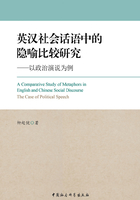
1.2 Rationale and hypotheses
Metaphor has been a popular area of study for a long history,which could probably be traced back to the time of Aristotle in ancient Greece. Within that tradition,metaphor was typically treated as a device of the poetic imagination and the rhetorical flourish. It is a matter of extraordinary language use beyond the reach of someone who just talks,rather than human thought or action in everyday functioning. Specifically,metaphorical expressions were assumed to be mutually exclusive with the realm of ordinary everyday language:everyday language had no metaphor,and metaphor used mechanisms outside the realm of everyday conventional language (Lakoff,1993).
However,with the emergence of cognitive linguistics,especially since the publication of the book Metaphors We Live By coauthored by Lakoff and Johnson (1980),a growing number of scholars both in and out this scope have started to cast a cognitive light on the study of metaphor,accepting that metaphor is not just a rhetorical tool or a linguistic phenomenon,but a way of human thinking,and that metaphor plays an important role in everyday language and social activities and it acts as a powerful cognitive tool for human categorization and conceptualization of the physical world. The recent work of this field includes Lakoff & Johnson (1980a,1980b,1999),Kövecses (1986,1990,2000,2005,2010),Johnson (1987,2007),Lakoff (1987,1993),Lakoff & Turner (1989),Taylor (1989),Turner (1990,1992,1993,2000),Croft (1993),Glucksberg & Keysar (1993),Zhao (1994,1998,2001),Yu (1995,1998,2003),Fauconnier (1997),Goatly (1997,2007),Grady (1997),Lin (1997),Shu (1998,2000,2003),Wang Y (2000,2004,2006,2008),Fauconnier & Turner (2002),Koller (2002,2004),Shu & Tang (2002),Lan (2003,2005),Li & Liu (2003),Littlemore (2003),Ritchie (2003,2013),Wang W (2003,2006,2007),Hu (2004),Gibbs (2006,2008),Littlemore & Low (2006),Tang (2007),Wei (2007),Xie (2007),Wang & Wang (2008). Therefore,it can be suggested that contemporary metaphor research has basically transferred from the traditional rhetoric into many other areas and disciplines,such as psychology,philosophy,anthropology,sociology,linguistics,literary criticism,cognitive science,translation and so on.
If metaphors are not just rhetoric ornaments,but a way of human thinking,there is then no reason why this potential could be only used to structure the concepts underlying certain abstract words,and why it could not show up in the way we approach the complex scientific,political and social issues of the world (Ungerer & Schmid,2008:144-5). After all,language is a tool,and a process of human perception and description of the world (Pan,2001:28). Metaphor then can be applied to many aspects of social activities in which politics is what we would expect metaphorical expressions to be used since the top purpose of political rhetoric is persuasion,or,more bluntly,the creation of political myth among people.
Since 1970s,there has been a number of prior work on metaphor in political discourse,which covers the exploration of the nature,mechanism and working process of metaphorical cognition. For example,Lakoff (1991,2002,2003,2004,2006a,2006b,2008),Miller (1992),Graber (1993),Chilton (1996,2004),Mio (1997),Li (2000),Wang & Li (2003),Charteris-Black (2004,2011,2014),Musolff (2004,2006,2016),Huang (2006),Zhu (2007),Cao (2008),Chen & Liu (2009),Huang & Wu (2009),He (2011,2014),Wu & Pang (2011),Wang J(2012),Wang & Yang (2012),Wu (2012,2016),Wang S(2014),Wen (2014),Liang (2015),Liang & Wang (2015),Wang & Zhang (2017). However,due attention has not yet been given to a systematic comparative study of conceptual metaphors in the background of different political languages. The reason is that most scholars in China show great enthusiasm for the introduction of western metaphor theories,and yet,they tend to neglect the comparative study of metaphor in English and Chinese based on the theories they advocated. Consequently,the potential values of these theories have not been fully explored (Liu,2008:25).
So,an important and urgent study in this scope is to conduct a systematic comparative research on metaphor based on other languages rather than English within different discourse patterns,such that it would be possible to test whether abstract thoughts are partially constructed and realized in terms of metaphorical reference in these languages. Thus,the following hypotheses could be proposed:
·Since human social activities are deeply rooted in their bodily and cultural experiences,of which people from different cultural communities share a large part,we may assume that the universality of metaphor holds true in different political languages.
·There should be some variations in the conceptual system of people from different cultures as human experiential bases are not excluded from their specific social and cultural patterns. Specifically,it is the concrete conceptual domains with highly organized structures that get mapped onto the relatively abstract conceptual domains which do not possess systematic structures in political languages,although Wang W(2003;2007) suggests that there is not only the use of the concrete to evoke the abstract in Chinese,but also the employment of the concrete to metaphorize the concrete,the abstract to metaphorize the concrete and the abstract to metaphorize the abstract.